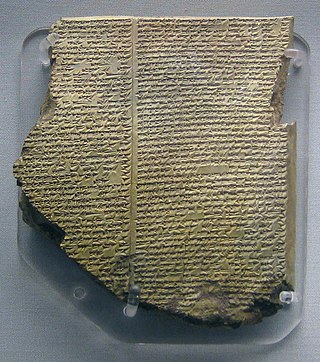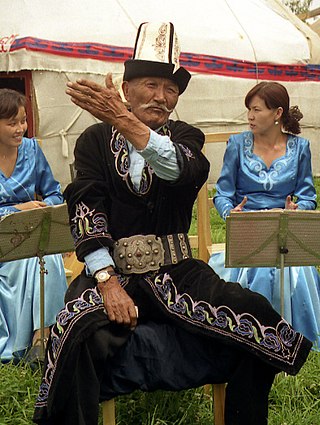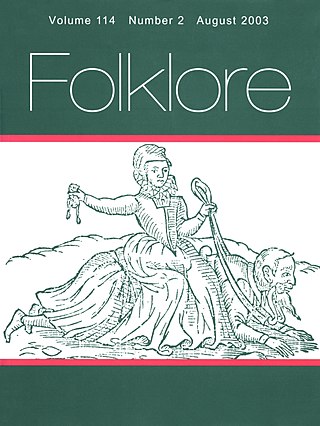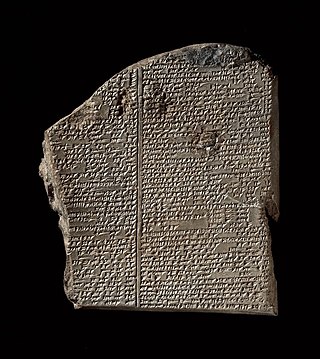
An epic poem, or simply an epic, is a lengthy narrative poem typically about the extraordinary deeds of extraordinary characters who, in dealings with gods or other superhuman forces, gave shape to the mortal universe for their descendants.

Folklore is the whole of oral traditions shared by a particular group of people, culture or subculture. This includes tales, myths, legends, proverbs, poems, jokes, and other oral traditions. They include material culture, such as traditional building styles common to the group.

Poetry, also called verse, is a form of literature that uses aesthetic and often rhythmic qualities of language − such as phonaesthetics, sound symbolism, and metre − to evoke meanings in addition to, or in place of, a prosaic ostensible meaning. A poem is a literary composition, written by a poet, using this principle.

A legend is a genre of folklore that consists of a narrative featuring human actions, believed or perceived to have taken place in human history. Narratives in this genre may demonstrate human values, and possess certain qualities that give the tale verisimilitude. Legend, for its active and passive participants, may include miracles. Legends may be transformed over time to keep them fresh and vital.

Oral tradition, or oral lore, is a form of human communication wherein knowledge, art, ideas and cultural material is received, preserved, and transmitted orally from one generation to another. The transmission is through speech or song and may include folktales, ballads, chants, prose or poetry. In this way, it is possible for a society to transmit oral history, oral literature, oral law and other knowledge across generations without a writing system, or in parallel to a writing system. Religions such as Buddhism, Hinduism, Catholicism, and Jainism, for example, have used an oral tradition, in parallel to a writing system, to transmit their canonical scriptures, rituals, hymns and mythologies from one generation to the next.
The history of literature is the historical development of writings in prose or poetry that attempt to provide entertainment or education to the reader, as well as the development of the literary techniques used in the communication of these pieces. Not all writings constitute literature. Some recorded materials, such as compilations of data are not considered literature, and this article relates only to the evolution of the works defined above.

Classical Chinese poetry is traditional Chinese poetry written in Classical Chinese and typified by certain traditional forms, or modes; traditional genres; and connections with particular historical periods, such as the poetry of the Tang dynasty. The existence of classical Chinese poetry is documented at least as early as the publication of the Classic of Poetry (Shijing). Various combinations of forms and genres have developed over the ages. Many or most of these poetic forms were developed by the end of the Tang dynasty, in 907 CE.
Narrative poetry is a form of poetry that tells a story, often using the voices of both a narrator and characters; the entire story is usually written in metered verse. Narrative poems do not need to rhyme. The poems that make up this genre may be short or long, and the story it relates to may be complex. It is normally dramatic, with various characters. Narrative poems include all epic poetry, and the various types of "lay", most ballads, and some idylls, as well as many poems not falling into a distinct type.

A bylina is a type of Russian oral epic poem.

Folklore studies is the branch of anthropology devoted to the study of folklore. This term, along with its synonyms, gained currency in the 1950s to distinguish the academic study of traditional culture from the folklore artifacts themselves. It became established as a field across both Europe and North America, coordinating with Volkskunde (German), folkeminner (Norwegian), and folkminnen (Swedish), among others.

Oral literature, orature or folk literature is a genre of literature that is spoken or sung as opposed to that which is written, though much oral literature has been transcribed. There is no standard definition, as anthropologists have used varying descriptions for oral literature or folk literature. A broad conceptualization refers to it as literature characterized by oral transmission and the absence of any fixed form. It includes the stories, legends, and history passed through generations in a spoken form.

Azerbaijani literature is written in Azerbaijani, a Turkic language, which is the official state language of the Republic of Azerbaijan, where the North Azerbaijani variety is spoken. It is also natively spoken in Iran, where the South Azerbaijani variety is used, and is particularly spoken in the northwestern historic region of Azerbaijan. Azerbaijani is also spoken natively in Russia, Georgia and Turkey. While the majority of Azerbaijani people live in Iran, modern Azerbaijani literature is overwhelmingly produced in the Republic of Azerbaijan, where the language has official status. Three scripts are used for writing the language: Azerbaijani Latin script in the Republic of Azerbaijan, Arabic script in Iran and Cyrillic script formerly used in Soviet Azerbaijan.
Finnish poetry is the poetry from Finland. It is usually written in the Finnish language or Swedish language, but can also include poetry written in Northern Sámi or other Sámi languages. It has its roots in the early folk music of the area, and still has a thriving presence today.

Vasile "Vasko" Popa was a Serbian poet.

Poetry as an oral art form likely predates written text. The earliest poetry is believed to have been recited or sung, employed as a way of remembering oral history, genealogy, and law. Poetry is often closely related to musical traditions, and the earliest poetry exists in the form of hymns, and other types of song such as chants. As such, poetry is often a verbal art. Many of the poems surviving from the ancient world are recorded prayers, or stories about religious subject matter, but they also include historical accounts, instructions for everyday activities, love songs, and fiction.

The Greek word aoidos referred to a classical Greek singer. In modern Homeric scholarship aoidos is used by some as the technical term for a skilled oral epic poet in the tradition to which the Iliad and Odyssey are believed to belong.

Literature is any collection of written work, but it is also used more narrowly for writings specifically considered to be an art form, especially prose, fiction, drama, poetry, and including both print and digital writing. In recent centuries, the definition has expanded to include oral literature, also known as orature much of which has been transcribed. Literature is a method of recording, preserving, and transmitting knowledge and entertainment, and can also have a social, psychological, spiritual, or political role.
Epic is a narrative genre characterised by its length, scope, and subject matter. The defining characteristics of the genre are mostly derived from its roots in ancient epics. The epic is no longer limited to the traditional medium of oral poetry, but has expanded to include modern mediums including film, theater, television shows, novels, and video games.
Azerbaijani folklore is the folk tradition of Azerbaijani people which has developed throughout the centuries. Azerbaijani folklore is embodied explicitly in a large collection of narratives and implicitly in representational arts, such as vase painting and votive gifts.

Albanian epic poetry is a form of epic poetry created by the Albanian people. It consists of a longstanding oral tradition still very much alive. A good number of Albanian epic singers can be found today in Kosovo and northern Albania, and some also in Montenegro. The Albanian traditional singing of epic verse from memory is one of the last survivors of its kind in modern Europe, and the last survivor of the Balkan traditions.












